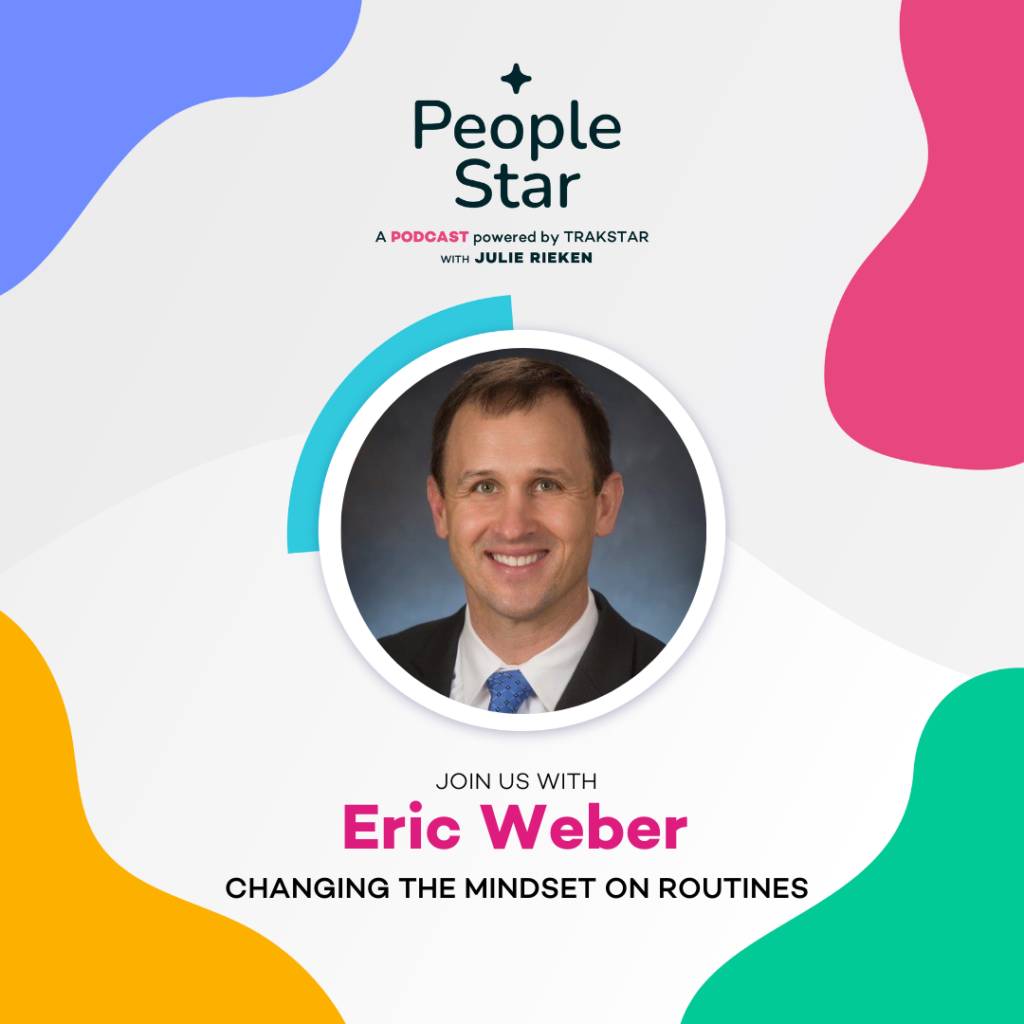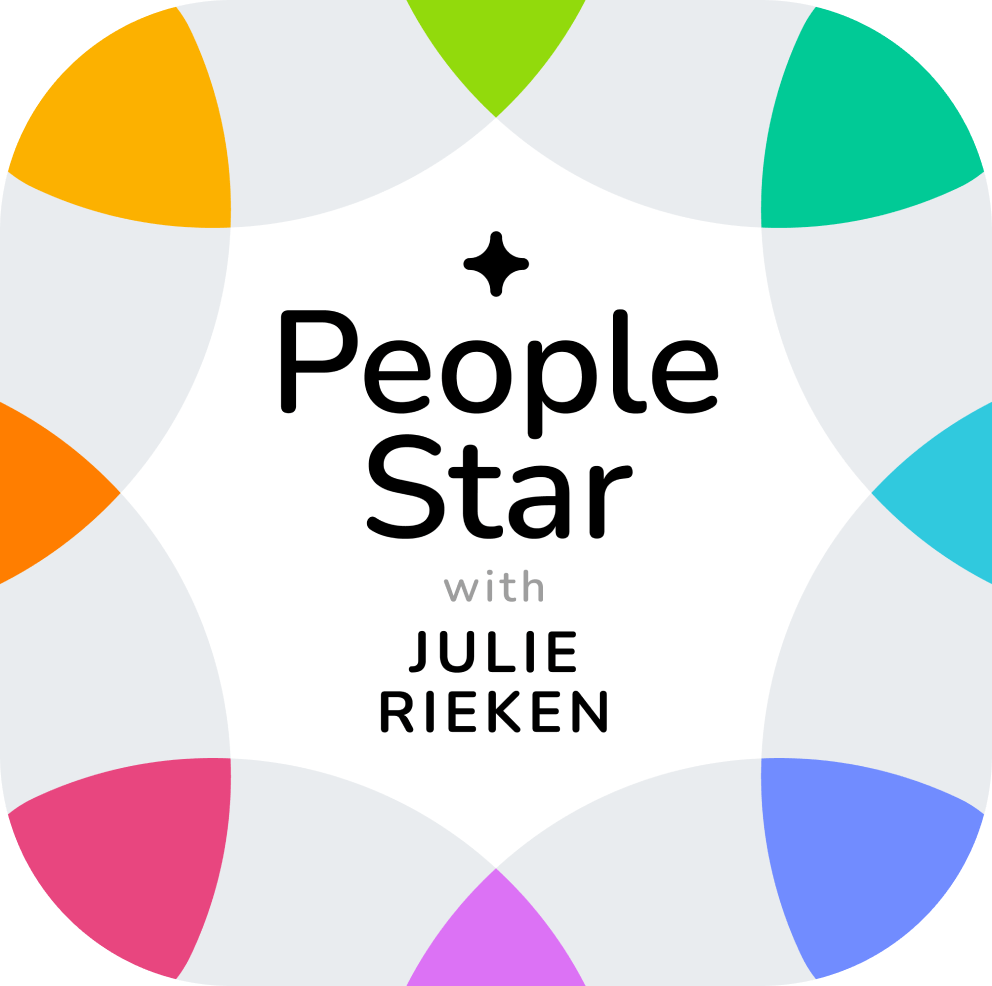PeopleStar_Eric Weber: this mp3 audio file was automatically transcribed by Sonix with the best speech-to-text algorithms. This transcript may contain errors.
PeopleStar Podcast Intro:
Welcome to the PeopleStar Podcast. We deliver leadership perspectives from industry experts on their people, architecture, routines, and culture as they solve HRs newest challenges. And now your host, Julie Rieken.
Julie Rieken:
Hello podcast listeners. Julie Rieken, host of PeopleStar Podcast, and today I'm really honored to have Eric Weber with us. Eric has been an HR professional across the US and has worked in a lot of roles in HR with some companies that you're going to recognize, ExxonMobil, Kellogg, Coca-Cola, and today he's the HR manager for the Information Technology Department at International Paper, another company that you'll recognize with approximately 1,200 IT professionals worldwide, and he's reporting to the CIO. And Eric, I'm so pleased to have you on the podcast.
Eric Weber:
Thank you very much for having me. It's my pleasure.
Julie Rieken:
One of the things that Eric brings to leadership is a background actually in the military, in the Army. And this, I think, brings a really interesting juxtaposition of backgrounds and current roles. And I'll bet it's really affected you in a lot of ways, in the ways that you think about leadership, Eric, tell me more.
Eric Weber:
Yeah, it has exactly that, it's done that. When I was in the Army, I can remember very clearly one of the roles I had was supporting a very large organization of 500 people. And this organization had three primary organizations called Batteries. And what I realized quite clearly one day is all three of these organizations, by definition from the government, are equipped, funded, resourced, exactly the same way, exactly, down to the button on the uniform. Yet when observing them in practice and deployment, the three behaved dramatically different, dramatically. And it was just a fascinating realization to see that almost from a laboratory perspective, if you can neutralize all the variables of an organization and in this case make them equal, you could still see extremely different outcomes from those organizations. And essentially it was the elements, magical elements to me, some science behind it of leadership and teamwork. And that really has created a lifelong inspiration for me to work with-in the human resources field to try to help organizations, teams, individuals reach that really special point when people look back and say, what a great team, what a great organization, and that continues to motivate me and keep me focused on helping out the organization today.
Julie Rieken:
I love that. The idea that people would reflect back and say what a great team, what an organization, and that's such a good aspiration in a human role. And I want to pull on another thread here because I think, I'm sensing three things coming together here. What a great organization blended with your experience in the military, blended with things that I would maybe associate with the military, which is one of the things I like to talk about on, on PeopleStar, which is routines. We often talk about people, architecture, routines, and culture. And I imagine the army is a place with routines, and I'm wondering, have you, can you just talk to me a little bit about how routines played a role for you in forming your leadership perspective and how you were able to use those to maybe build great organizations where people would say these kinds of things?
Eric Weber:
Oh, absolutely, and routines are just fascinating to me. So another realization I had in the army. So as a young man, I go to West Point and I have aspirations to do big, exciting, bold, adventurous things, see the world, do wild things, everything that you read about in a novel or you see on a movie that was going to be my path, and so I did it. And then one day I realized as I was at my desk working on Excel spreadsheets in the Army, getting a report ready, I realized that in summation, what society would view as a really exciting role, a really exciting job is about, is about 90% bureaucracy and so, you know, just, but it doesn't stop there. Think about TV shows that you watch, a long-running medical show with Grey's Anatomy, but they've never done an episode on all the patient records that the doctors have to fill out, right? It's always nonstop action, everything, we're saturated with these inspirations that lead us to think that things are nonstop peak, nonstop excitement, nonstop action, nonstop break out product or, or what have you on an innovative set point. But when you pause, just the pragmatic reality was that the vast, vast majority of any profession you choose is going to have a whole lot of routine, is going to have a whole lot of preparation, that's going to have a whole lot of administration, the necessary logistics to make the exciting things even happen. And then when I realized that in the army, I remembered a lecture that I had in school, I wish I could remember the gentleman's name. He was also a West Point graduate, he was, at the time, an executive for NBC. And this is a great story, I'm going to try to do it justice succinctly. He's an executive working downtown, NBC, Corner Office, Manhattan, king of the world. And he was bored out of his mind, he hated his life, he hated the monotony, he hated the routine, and it was just bored. He needed a break. So he said, I'm going to go find adventure. Where else do you find adventure? I want to go on a safari to the deep, dark Amazon jungle. So far in that they're going to be indigenous populations to include supposedly headhunting tribes. I got to find adventure, I got to spice up my life, I got to get that spark back. And so he went out on, the …, I don't know what it's called in the Amazon, but we'll say it's an adventure. And he's out there and he's with the group and he got lost. So now the group is somewhere, he's not with them, he's lost. He is now lost in the Amazon in an area of indigenous people known to be headhunters. And he said he was lost, confused, yes, he had a lot of army experience, but he's never been lost in the Amazon before. His adrenaline is running, it was, was through the roof. His pulse was through the roof. What is he going to do? He was right around at the moment of panic. Right at that moment, he heard a rustling in the leaves, and his panic level hit new heights. So he hid as best as he could and stayed as quiet as best as he could next to a big tree, the rustling in the leaves continued. Was it an animal? Was it his group or what have you? It turns out it was a resident of the area, a member of the indigenous population who came through and sat down on the opposite side of the tree of this individual. However, the angle wasn't explained to him. He could see the individual, the individual didn't know he was there. And that is at that moment that I had a life-changing realization as I was sitting next to that tree, my heart racing, sweating, I've never had more of a century of intense sensory awareness in my life. Every ounce of my body was in tune to the moment, I look no more than five feet away from me. And I saw a man just like me in New York, bored out of his mind with his surroundings.
Julie Rieken:
Oh!
Eric Weber:
And he said it was at that moment that I realized that I didn't need to leave my office in New York, I needed to change my perspective. And what I failed to do every moment of my professional life was to keep my senses turned on, look for the stimulus in my environment that's exciting because it's there. And he said, in that moment, I imagined, what if that person sitting next to me, that member of the tribe, was that person was in my office in New York right now? Probably be feeling the same type of wonderment, confusion and amazement. And why don't I when I go back to New York, I don't … I live my life and interact with people with that same level of emotional and sensory fascination. And that was that, and so as I was sitting in my office reflecting on all my administrative minutia and I remember that gentleman's quote, I thought, it's up to me to reframe how you look at that. I'm a big fan of Toyota, the Toyota way of manufacturing, lean manufacturing, and using statistical analysis. I'll try to bring this back to HR using statistical analysis to make work better. And with lean manufacturing, you might use parade analysis to find an 80-20 principle. And so what I try to do within routine is, first of all, from an emotional perspective is the classic rephrasing of this is not something I have to do, this is something I get to do. There are probably a number of people that would trade places with me in a heartbeat, and I can't forget that, so I need to be excited about that. And then within the routine elements, without giving away all the things I do within the company here that, which I feel helped make us competitive, when we find ourselves frustrated with routine, when we find ourselves frustrated with the administrative requirements of the work that we need to do, what I, what I encourage people to do is maybe gather the partners in that work stream together. And this has to be an informal way to apply things like Toyota manufacturing or lean manufacturing. You can gather the people that are involved in that work routine or that process together, and a fun exercise to do with sticky notes on the wall or using a social media collaboration tool, would be to simply brainstorm everything that has gone wrong with that work product in the past. Every little thing, every little frustration that has created a roadblock or a redo or some type of inefficiency for that routine. And then a fun little challenge to the group is once you capture all of those elements that have gone wrong in a routine challenge to the group or encouraged groups, they can bring all of those elements to the very first step of the routine. And before we even start a routine, make sure we've got everything ready to go so that we don't have to start over again. … of like triple checking your luggage before you go on a trip or the plane takes off, you can't go back and get the socks out of the drawer. And so can you bring that type of mindset into the routine? And similarly to a trip, I look at it as getting ready to go on an adventure. And so those are fun things that I find are important and enjoyable because then I'm addressing 80% of what reality of life is. A lot of routine work to get to the high point. What I find even more precious is when you energetically look at how can I make the routine easier, better, more efficient? That creates the magic. I'd like to give credit for the book Getting Things Done. That brings magic to now you create more free time. It's not really free time. It's just unhinge time where your brain can have the freedom to be creative. And that's where the innovation comes from. So those are the things that excite me. I just want to share some of those stories with you.
Julie Rieken:
Oh, I wish people could see my reaction right now. Number one, that is not how I expected the Amazon story to end, …
Eric Weber:
… I read it, I didn't expect it to end that way either.
Julie Rieken:
That was just magic. And then that's so true. The idea that the other person would probably feel that way in the New York office. This has really, to say that this is life-changing, in 15 minutes, I actually think I'm going to really, I'm going to attack those spreadsheets with new vigor and energy today. And honestly, this has been amazing. And I love the idea of thinking about the sticky notes. That's a practical idea that, gosh, I could take that to my team today on how to, how to rethink routines and.
Eric Weber:
Yeah.
Julie Rieken:
And just think about things in a new way. So this shift in perspective, Eric, I knew today's conversation would be good and I think it's been better than I even expected. This has been awesome. Thank you for the advice. Thank you.
Eric Weber:
Yeah, thanks. I enjoyed it. Here's what gets me excited. Routines are boring, I'll be the first to admit it, they are so boring. But I have found that when you pour your energy into them, man, is it fun to have free time on the tail end?
Julie Rieken:
And I love that you said to open up, it's not to necessarily open up free time, it's just to open up a creative space.
Eric Weber:
Yeah, yeah. No one. No one can be crazy and inventive and thought better than done in a mind that's not distracted with to-do lists and those types of things. That's where these ideas come from, and it becomes somewhat of a positive reinforcing cycle because the team appreciates that we've gotten rid of some of those barriers, gotten rid of some of those obstacles. It is fun when a person says, oh my gosh, it took me so long, I was here till 6, 8, 9, 10:00 at night. It is fun to say, well then we failed because you should have been out of here at 4:30 where they had enough time to get home and do the groceries or what have you. Then 4:30 Because you got stuff done in a more efficient way it would have normally taken all day. So it's fun when the team then works to identify those obstacles that keep them up, keep them late, get those obstacles isolated and removed so that your work is done significantly more efficiently. And then that balance of time, all of a sudden your mind is like, what's next? What can I go after next? What else is eating up my time that I want to get rid of and I can get more efficient with? And then you get more benefit because you're more responsive to your customers, you're more responsive to your peers, you're more available to your friends and family. And it's all within the space that we're all, always going to have tons of work to do it. Generally speaking, if you're lucky enough to have a good career and a good job in HR is variable all the time. But when you can identify stuff that is recurring, it's repetitive, and you can work through any of those obstacles or failure points in the past, that's really fun. I've got a process, I won't share it exactly. I've got a process that I've gathered with my team. We've eliminated virtually all the errors and I've share with the team. This process was born out of all of my mistakes. I just counted my scars and I said, I don't want to cut, I don't want to get injured again. So what can I do to avoid self-inflicted injury on these processes? And from a humble standpoint, it's like, let's, if we aren't able to talk about how something went wrong previously, we're probably not going to be able to fix it as a team. And so there's a little bit of trust that needs to be in there as well in order to have those types of conversations.
Julie Rieken:
Wow. Thank you. This has been great. And maybe we'll dive into that in another podcast. But today's episode, I want to leave it exactly where it is because it's beautiful and so much learning. I'm just straight out of, out of routines and how to reframe them. This has been great. Eric, thanks for being a guest today.
Eric Weber:
Thank you so much. Thank you.
PeopleStar Podcast Outro:
Thanks for listening to the PeopleStar Podcast. For the show notes, transcript, resources, and more ways to get a seat at the table, visit us at TrakStar.com/Podcast.
Sonix has many features that you’d love including secure transcription and file storage, collaboration tools, automated transcription, share transcripts, and easily transcribe your Zoom meetings. Try Sonix for free today.




